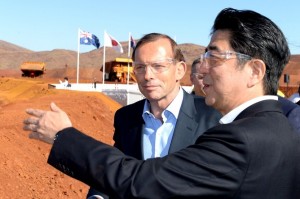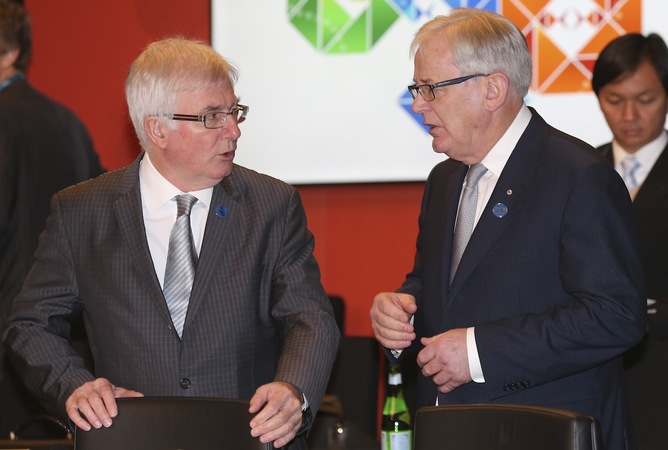Start moving in the
right direction.
Speak to us today to see how we can improve your business logistics, freight and customs related issues.
By Ann Capling, Murdoch University and John Ravenhill, University of Waterloo
Ten years on from the Australia-US Free Trade Agreement, Australia is entering another round of negotiations towards the new and controversial Trans-Pacific Partnership. In this Free Trade Scorecard series, we review Australian trade policy over the years and where we stand today on the brink of a number of significant new trade deals.

Students of international relations are often introduced to the problems involved in sustaining international cooperation through Jean-Jacques Rousseau’s fable of the stag and the hare.
Rousseau’s story told of a group of hunters that went out in search of a deer. Only if they all worked together would they be successful in trapping the deer. But a single hunter acting alone could catch a hare. Distracted by an opportunity to do so, one hunter deserts the party chasing the deer – with the result that the deer escapes. The individual hunter catches a hare but because of the failure to cooperate the group misses out on the chance of trapping the deer, which would have brought greater benefits to all.
The fable is used to illustrate the difficulties of sustaining cooperation, for instance in international cartels, when individuals have an incentive to realise short-term gains through cheating on their partners.
It is equally relevant to international negotiations where countries, especially relatively small players on the international stage, are likely to achieve better outcomes acting cooperatively with others than they would achieve individually. For many years, this was the conventional wisdom regarding Australia’s participation in international trade negotiations.
Three decades ago, when Canberra was first contemplating the American offer of a bilateral trade agreement, the distinguished trade economist, Richard Snape, warned that acting by itself, Australia would have little leverage in international negotiations. Far better to negotiate in partnership with like-minded countries, a strategy that Australia pursued with some success during the Uruguay Round of global trade negotiations when it was a prime sponsor of the Cairns Group of fair agricultural traders.
In the last decade Australia has jumped on board the bandwagon of preferential trade agreements with seemingly an ever-growing enthusiasm. Not surprisingly, given the country’s limited coin in international trade negotiations, the benefits of these agreements have been modest at best. Even when negotiating with smaller economies such as Thailand and Malaysia, Australia has made few market access gains relative to those achieved by its partners.
The Productivity Commission warned that:
“At least in some quarters, there tends to be a mindset of ‘agreements for agreement’s sake’, premised partly on the view that Australia must follow a trend in other countries”.
This has been particularly true of the Abbott government, which in its rush to complete bilateral trade agreements seems to have forgotten elementary principles of negotiation.
When it came into office, the Abbott government signalled its frustration with the stalled trade negotiations with China, Japan and Korea and asserted that “this government is determined to bring them to a swift and satisfactory conclusion”. Quality, however, was sacrificed for speed in reaching an agreement.
The essential trade-off in the recent negotiations with Japan was supposed to be duty-free access to the Australian market for Japanese cars in return for substantially improved access for Australian agricultural exports, especially beef, to the heavily protected Japanese market.
The outcome was cuts that would leave tariffs on beef in the 19.5 to 23.5% range, and take from 15 to 18 years for full implementation. Japanese concessions in the agricultural sphere were largely on products that are relatively unimportant Australian exports. The Australian Dairy Industry Council noted that it was “extremely disappointed” with a deal that left the tariff on fresh cheese, the most important dairy item in the negotiations, unchanged, while making a few symbolic concessions on products that together constitute only 10% of the total value of Australia’s dairy exports. The story in sugar was similar with the tariff unchanged on the main category of Australian exports.
The Japan agreement is a perfect illustration of Rousseau’s fable. Japanese protectionism on agricultural issues was inevitably going to be one of the principal obstacles to reaching agreement on a Trans-Pacific Partnership (TPP).

Australia decided to settle for a bilateral deal that gave it marginal advantages over others, such as beef producers in New Zealand, yet fell short of the aspirations of the TPP for reform of the Japanese agricultural market. This led to scathing criticism from its key allies in the fight against Japanese agricultural protectionism. The New Zealand Trade Minister, Tim Groser, noted that Wellington had tried to seek a trade agreement with Japan in the years 2005-8 but abandoned its bilateral negotiations when it perceived an opportunity to bring collective pressure to bear on Tokyo through the TPP negotiations.
The risk was Tokyo would not only split the pro-liberalising coalition but also establish perceptions both domestically and internationally of a reform threshold beyond which it would not go in the TPP negotiations. Australia’s strategy appeared to rest on the belief it could free ride on any concessions that the United States could extract from the Japanese government. But, having moved unilaterally to gain some minor concessions not currently enjoyed by its TPP negotiating partners, Canberra seems to be extremely optimistic in its faith they will use their leverage on its behalf.
This article draws on research prepared for the 2014 Workshop “Ten Years since the Australia-US Free Trade Agreement: Where to for Australia’s Trade Policy?”, sponsored by the Academy of the Social Sciences in Australia and Faculty of Arts and Social Sciences, UNSW Australia.

Ann Capling receives funding from the Australian Research Council.
John Ravenhill receives funding from the Australian Research Council
This article was originally published on The Conversation.
Read the original article.


Established in 1917, Clarke Global Logistics is a reputable Australian Customs Broker and Freight Forwarder; offering a totally integrated trade service both locally and globally.

Speak to us today to see how we can improve your business logistics, freight and customs related issues.